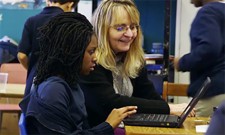University of Illinois Ushering in New Frontier of Computer Science Curriculum

CHAMPAIGN, Ill., December 19, 2018 (Newswire.com) - The University of Illinois at Urbana-Champaign has launched a five-year initiative that will educate and certify high school teachers to teach computer science. The Illinois Secondary Teacher Education and Computer Science (I-STECS) initiative, funded through the campus’ Investment for Growth program, will help address the shortage of high school computer science teachers in Illinois and across the nation.
“The I-STECS initiative responds directly to recent, urgent calls from politicians, business leaders, educational policymakers, and school administrators, especially in Chicago, for the establishment of programs of computer science throughout secondary schools in the State of Illinois and nationally,” says College of Education Dean James D. Anderson.
I think it's absolutely critical that we are teaching students not just a basic literacy in using computers but the skills they need to be able to innovate with computers—to create and implement new algorithms, new mobile apps, new medical devices, new entertainment media, new digital learning materials, and so on.
Gabrielle Allen, Associate dean for research in the College of Education and professor of astronomy
I-STECS will recruit undergraduate students to enroll in its program, including incoming freshmen in math and physics, students already in computer science, and education students who are interested in incorporating technology in their classrooms. In addition, I-STECS is developing summer institutes where teachers can receive credit. The program is also establishing connections with local schools to generate more computer science education beyond introductory classes. Initiative officials are encouraging schools who offer AP classes in computer science to expand those offerings.
“We will build capacity by developing a secondary teacher education program in computer science and an endorsement program for teachers locally, across the state, and nationally,” says Mark Dressman, a professor in Curriculum & Instruction in the University of Illinois’ College of Education and lead author and project coordinator of the initiative. “In these programs, teachers and pre-service teachers will acquire content knowledge in computer science as well as knowledge of how to teach this content to students in K-12 and, possibly, community college settings.”
I-STECS is a collaborative effort involving faculty and administrators from the College of Education, the College of Engineering (the Department of Computer Science), and the Council on Teacher Education.
“Between the College of Education and Department of Computer Science at Illinois, the expertise and experience are in place to develop a very strong program and help Illinois excel in this area,” says Chad Lane, associate professor in educational psychology. “It will also open up new possibilities for developing and deploying innovative methods for teaching computer science that are more age-appropriate and potentially engaging for younger learners.”
About the College of Education within the University of Illinois at Urbana-Champaign
Founded in 1905, the College of Education is one of the nation’s first land-grant schools of education, revered for its groundbreaking research, preparation of educator-leaders, and worldwide impact. U.S. News and World Report consistently rank the College and its programs among the world’s best. Home of the late Dr. Samuel Kirk, the “father of special education,” and now more than 70 tenure-track faculty and over 2,000 undergraduate, graduate, doctoral, and online students—Great Minds Think Illinois.
The University of Illinois at Urbana-Champaign, founded in 1867, has a total enrollment of over 47,000 students from all 50 states and more than 100 countries. The University of Illinois pioneers innovative research—like inventing the MRI, designing the first graphical web browser, and defining the modern tree of life—to tackle grand challenges and expand the human experience. With interdisciplinary hubs of discovery including the National Center for Supercomputing Applications and the largest public university library in the nation, our transformative learning experiences are designed to produce alumni who desire to make a significant societal impact.
Contact
Gina Manola, Director of Marketing and Communications, College of Education
University of Illinois at Urbana-Champaign
217-300-5939
Source: College of Education at the University of Illinois at Urbana-Champaign